Top 10 Vitamin A Foods Which You Can Include In Your Diet
Just like other vitamins and minerals, our body requires enough supply of Vitamin A, a micronutrient to maintain overall well-being and health.
But do you know an interesting fact that our bodies cannot produce Vitamin A? So, how do we get it? Well, we can meet the Vitamin A requirements of our bodies by consuming foods that are rich in Vitamin A. This fat-soluble vitamin is stored in our liver and is later used by our bodies when needed.
In this blog, let’s delve into the various benefits of consuming Vitamin A-rich foods and what are the top Vitamin A foods we must include in our diet, to have enough of this essential micronutrient.
Benefits Of Eating Vitamin A Rich Foods
Vitamin A is said to support various physiological functions in our bodies, however, some of the major benefits of eating Vitamin A-rich foods are:
-
Aids In Maintaining Good Vision
One of the most vital functions of Vitamin A is maintaining good vision. Our eye must create specific pigments for the retina to function properly, allowing us to see the entire light spectrum. Additionally, vitamin A is used by our bodies to create corneal moisture and the pigments necessary for healthy retinal function. Age-related macular degeneration (AMD) and cataract development may also be decreased by taking foods high in vitamin A.
-
Strengthens Immune System
Vitamin A supports white blood cells and the mucus membranes in our lungs, intestines, and urinary tract, which enhances the immune system. This aids in protecting us against disease-causing toxins and infections (also known as free radicals).
-
Vitamin A For Skin
It is proven in many researches that vitamin A can be used to alleviate wrinkles, age spots, and skin changes brought on by ageing. Vitamin A deficiency can cause clogged sweat ducts, which raises your risk of developing acne.
-
Supports Reproductive Health
For good reproductive function, our diet must contain adequate amounts of vitamin A. Lack of vitamin A can impair a woman's ability to conceive and can delay a child's growth and development.
-
Maintains Bone Health
Our risk of injury or impairment is reduced because vitamin A maintains healthy bone growth and development. But it's crucial to maintain a balance.
Different Forms Of Vitamin A
There are two major forms of Vitamin A:
Carotenoids
Plant-based meals like carrots and sweet potatoes, fortified foods (foods that have vitamins added to them), and supplements all include carotenoids (provitamin A). Beta-carotene, one of the most prevalent carotenoids, is what gives plants their orange and red hues.
Retinoids
Animal-based foods like eggs, fish, milk, and liver contain retinoids (also known as retinol or preformed vitamin A).
What Are The Best Sources Of Vitamin A?
Reading through the various benefits, you must be curious as to what are the best sources of Vitamin A. Well, not taking much of your time, let’s directly jump on the various Vitamin A-rich foods, which you must include in your diet the moment you finish reading this blog.
Top 5 Vitamin A Vegetables
-
Carrots
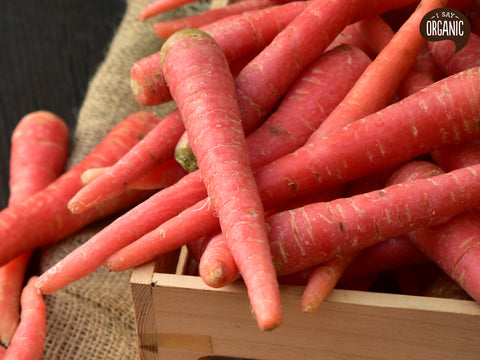
The best source of vitamin A, specifically beta-carotene, is carrots. Antioxidants included in it strengthen your immune system and enhance your vision. Additionally, carrots include fibres that help avoid constipation and enhance gut health as well as vitamins B, C, and K.
#ISayOrganicTip - You can get your hands on the organically grown and chemical-free carrots from I Say Organic, however, if you find it a tedious task to peel and then consume carrots, worry not check out our tasty Carrot Kanji.
-
Sweet Potatoes
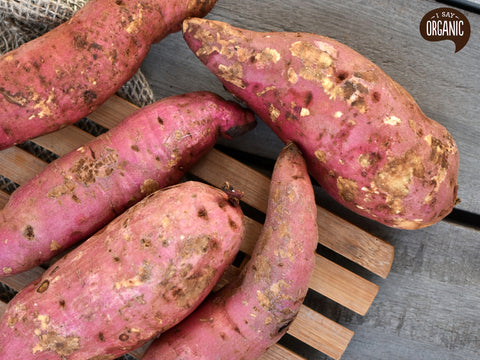
Beta-carotene, a type of vitamin A, is abundant in this root vegetable. Your daily requirement of vitamin A can be satisfied by one large sweet potato with skin. Additionally, it contains fibre, vitamin C, vitamin B complex, and potassium, all of which may aid in blood sugar regulation.
#ISayOrganicTip - Buy the finest quality and organically grown sweet potatoes sourced from Rajasthan at I Say Organic.
-
Spinach
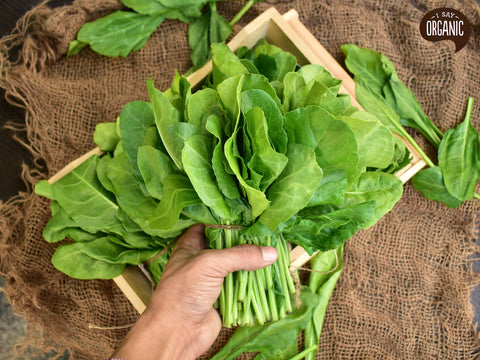
Magnesium, iron, and vitamin A are all abundant in spinach. According to research, spinach helps decrease blood pressure and strengthen the heart.
#ISayOrganicTip - You can prepare spinach soup in winter or can use spinach in salad dressings.
-
Pumpkin

Another excellent source of vitamin A is pumpkin. This orange vegetable is a good source of antioxidants and beta-carotene, which help to protect your eyes and improve vision.
#ISayOrganicTip - You can make pies, soup, and snacks using organic pumpkin from I Say Organic.
-
Red Bell Peppers
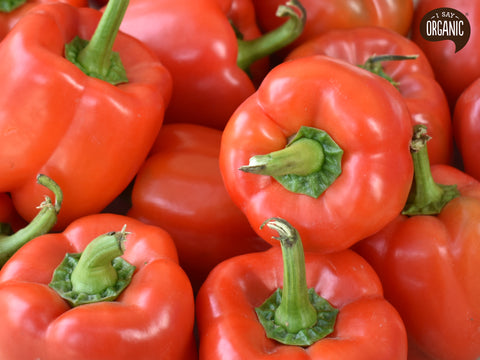
A tasty food that is rich in vitamins A and C is bell peppers. Red bell peppers are a good source of capsanthin, an antioxidant that helps you stay healthy by reducing internal and external inflammation.
Top 5 Vitamin A Fruits
-
Papaya
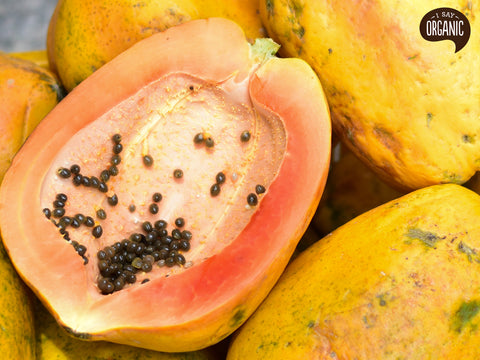
Abundant in Vitamin A antioxidants, this Vitamin A-rich fruit is great for your eyes since it not only protects the retina but also the cornea and helps to stop retinal degeneration.
#ISayOrganicTip - Semi-ripe papaya can be consumed as a smoothie, dessert, or for breakfast.
-
Mango
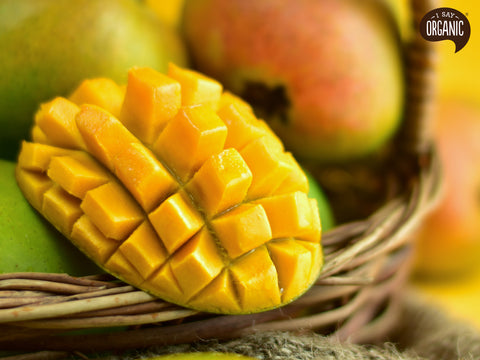
Mangoes are revered as the king of fruits and are a fantastic source of fibre, vitamins A and C, minerals, and other nutrients.
#ISayOrganicTip - The delight of savouring smoothies made from organic safeda mango is unmatched on hot summer days.
-
Watermelon
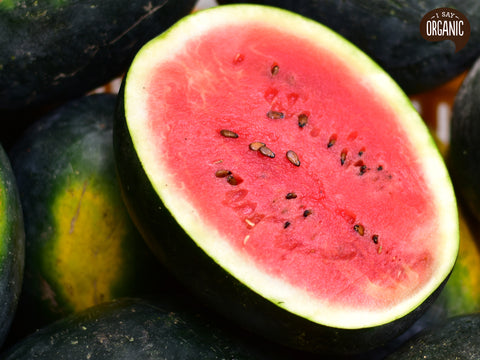
Loaded with Vitamin A, watermelon has a miraculous effect on your immune, skin, and eye health.
-
Apricots
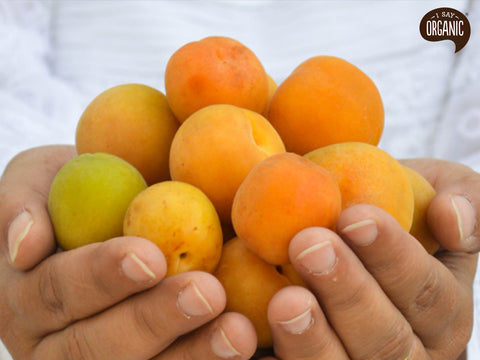
Apricots are a rich source of Vitamin A helping in improving vision, strengthening the immune system, and shielding the skin. Apricots assist in lowering the risk of ageing-related eye issues.
Vitamin A plays a vital role in our overall well-being. The best way to ensure that your body gets enough Vitamin A is by including foods that are rich in Vitamin A.
I Say Organic brings you the best collection of organic fruits and vegetables online along with various other quality cooking essentials that keep all your health-related worries at bay.
FAQs For Vitamin A Foods
-
How much vitamin A do you need per day?
An adult aged between 19 to 64 years of age requires 700 µg a day for men and 600 µg a day for women.
-
What are the best ways to cook vitamin A-rich foods?
The best way to cook Vitamin A foods is by sauteing them in desi ghee or cold-pressed oils.
-
Do I need to eat vitamin A-rich foods every day?
Yes, you can include Vitamin A-rich foods in your daily diet.
-
What happens if I take too much vitamin A?
Consuming too much Vitamin A can lead to headaches, nausea, blurred vision or dizziness.






